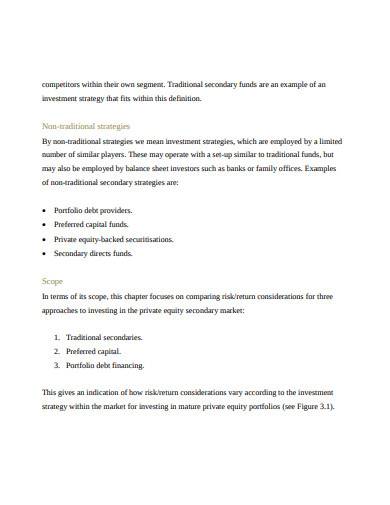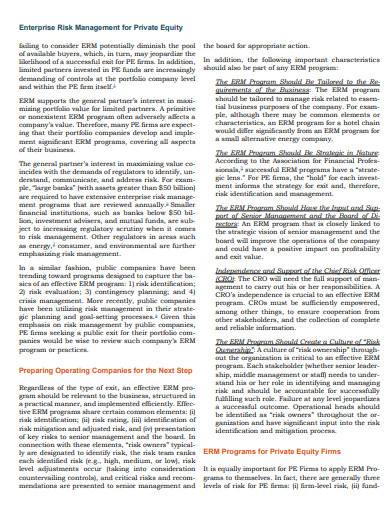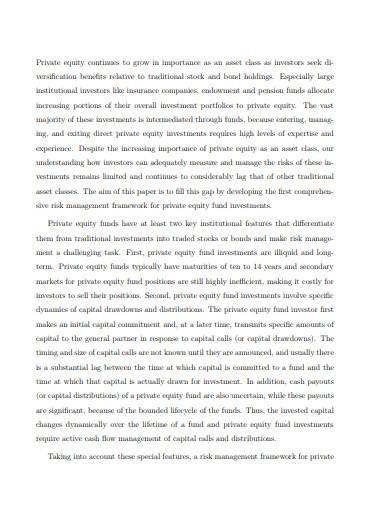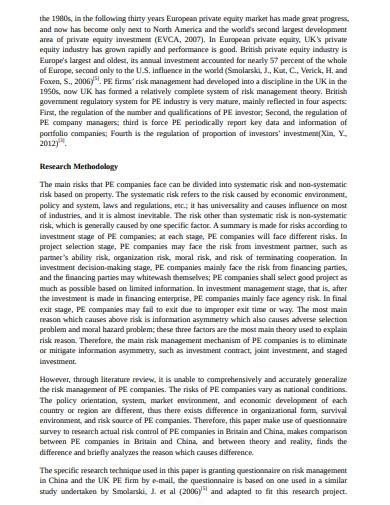Investing your money in any investment, such as equity funds to earn a profit, comes with risks, which have pushed away many potential investors, especially to those who have a low-risk appetite. However, what if I will tell you that, just like implementing an attendance management policy to deal with attendance issues, you can actually deal with these risks? Yes, that’s right! You can deal with these risks through Private Equity Risk Management. Today, we are going to discuss more of it in this article.
What is Private Equity?
Private equity funds are the investment funds that private equity firms or venture capital firms created to restructure companies that are not available for public trade, such as a stock exchange. These investors may have distinct goals and ways to attain them, but they all aim to provide a capital that will promote the growth of a company by developing a new product or restructuring the business framework.
American weekly business magazine, Bloomberg Businessweek refers to this type of investment as a leveraged-buyout, which means that the company uses external capital to accomplish its growth. Unfortunately, just like small business investments, private equity comes with risks, which merits discussion in the next section.
Risks of Private Equity Investment
As you may have probably known, Private Equity Investment has institutional features, creating distinctions from the other types of investment. Firstly, it is an illiquid asset. Meaning, you cannot easily convert it to cash, making it suitable if you intend to get into a long-term investment. Secondly, it involves capital drawdowns, which implies that it may take sometime before the fund manager uses your initial investment for an actual investment as the person waits for the best time to invest as part of their strategic plan for the asset allocation. Given its features, equity investment poses risks to the following aspects:
1. Market
A tough situation may cause the companies in the portfolio to lose their market prices, which can expose the investors to market risks.
2. Liquidity
Due to its illiquidity, associated asset liquidity risks of its secondary markets selling positions, such as the possible massive discounts in the asset’s net value, are lurking around.
3. Cash Flow
This type of investment allows the investor to pay in installment. However, there are chances that the investors cannot pay according to the payment terms due to personal reasons, etc., risking them to lose the private equity partnership interests.
What is Private Equity Risk Management?
Simply put, Private Equity Risk Management is an approach that allows investors to identify, evaluate, and prioritization of the risks posing to private equity investments. Following the private equity risk management processes, risks managers determine the proper strategy to allocate the resources to minimize the impact of these risks or avoid these risks altogether.
3+ Private Equity Risk Management Samples in PDF
Are you looking for examples of private equity risk management? Try the downloadable documents that we gathered in this section!
1. Risk Management in Private Equity
2. Enterprise Risk Management for Private Equity
3. Risk Management for Private Equity Funds Sample
4. Risk Management of Private Equity Firms Template
Private Equity Risks Prevention
Investing your money in Private Equity poses risks of fraud and misconduct, such as financial reports manipulations, bribery, corruption, and market misconduct. Fortunately, you can prevent these risks by following the steps below:
1. Research
Don’t invest in anything that you are not knowledgeable enough. Some firms provide information solely to win the clients. Thus, you have to do separate research to determine the best private equity firms to invest in. Aside from that, you should delve deeper into the investment type itself by doing more research about the industry. Learn more about the violations of the Anti-Money Laundering (AML) and Office of Foreign Assets Control (OFAC). By doing this, you will get an idea of how it really works, allowing you to detect any suspicious actions that your chosen firm performs.
2. Get an Attorney’s Advice
Sometimes, research may not be enough. Seek advice from your attorney before signing any agreements and contracts. Let the professional check each clause to know if it needs modification or further discussion to ensure that it will not backfire you. Attorneys can also detect any suspicious and unfair terms that the private equity firm includes.
3. Ensure that the Private Equity Firm Performs Annual Compliance Review
Private Equity investment is a long-term investment. Therefore, don’t just rely on what they show you before you invest. Make sure that they comply with the government rules and regulations and have a certificate of an annual compliance review.
4. Require that your Portfolio Companies Do the Following:
First, ensure the firm performs regular risk assessments, such as fraud risk assessment, which will allow you and the private equity firm to verify its industry affiliation, operation location, compliance requirements, contingency plan, etc. Second, make certain the firm implements well-designed compliance policies and procedures. Meaning, it should conduct proper training about the compliance and present a compliance audit report. Lastly, the firm should state in their policies ad procedures about the mechanisms of a whistle-blower. This content will encourage the employees and other relevant entities to report about fraudulent and suspicious actions within the company.
5. Check the Private Equity Firm’s Risk Management Framework
Aside from the portfolio companies, your investment management firm itself must have a proper protocol in handling risks. By checking their liquidity risk management, operational risk management, and other relevant risk management, you can ensure that your investment is in good hands. You can also inquire about their private equity risk management policy or the private equity risk management software they use to increase this assurance.
Private Equity Investment is one of the most considerable investments that you can avail of. Despite its associated risks, you should be confident whether or not this type of investment will fit your risk appetite. If it does not, don’t worry because you are not running out of options to choose from. You can try other means of investment, such as stocks, bonds, mutual funds, etc. Just remember, do your homework first before you spend your money.
Related Posts
FREE 10+ Agile Project Management Samples in PDF
FREE 8+ Change Management Checklist Samples in PDF | DOC
FREE 5+ Risk Register Samples in PDF
FREE 6+ Resource Management Samples in PDF
FREE 5+ Vendor Management Samples in PDF
FREE 10+ Product Portfolio Management Samples in PDF | MS Word
FREE 10+ Management Work Plan Samples in PDF | DOC
FREE 13+ Communication Management Plan Samples in PDF | MS Word
FREE 9+ Time Management Resources Samples in PDF | MS Word
FREE 13+ Product Management Samples in PDF | DOC
FREE 10+ Management Memo Samples in PDF | DOC
FREE 11+ Real Estate Risk Management Samples in PDF
FREE 9+ Human Resources Management Plan Samples in PDF
FREE 7+ Stakeholder Management Strategy Samples in PDF | DOC
FREE 10+ Interest Rate Risk Management Samples in PDF | MS Word




